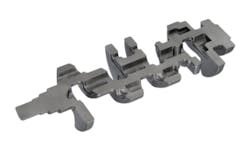GF Automotive granted a license to Riken Corporation regarding production of its automotive iron alloy, SiboDur®. Riken, a Japanese automotive parts manufacturer, has the right to produce the alloy in Japan and Southeast Asia.
Tokyo-based Riken has a series of business units supplying parts and systems to automotive OEMs, as well as other products. Its automotive castings include piston rings for cars, motorcycles, construction equipment, and marine engines; parts for suspension systems and steering systems, e.g., lower arms, steering knuckles; brake parts; camshafts; seal rings; valve lifters and valve seats.
SiboDur is a proprietary cast iron grade named for its particular combination of silicon and boron alloys, and for the durability that results by the alloy combination that achieves both hardness and ductility. GF developed the material and introduced it more than five years ago, for automotive crankshafts as well as structural components for chassis.
“It allows a much lighter construction of chassis parts in iron and competes successfully with aluminum and steel forgings in terms of performance and weight at a lower cost,” the group stated.
GF Automotive produces castings with SiboDur at two iron foundries in Germany, and it has licensed it to Grede Foundries for production in North America.
GF Automotive and Riken also agreed on a cross-marketing strategy: Riken will manufacture products for GF Automotive to supply to customers in Japan and Southeast Asia, and GF Automotive will supply castings to Riken customers in Europe.
“The agreement increases the penetration of our SiboDur alloy in the Asian region and enables both our companies to serve the global needs of our respective customers better,” according to Josef Edbauer, head of GF Automotive.
Noritada Okano, president of the Riken Corporation, said: “GF Automotive’s SiboDur enhances Riken’s technical capabilities and gives us the possibility to propose light and cost-effective solutions to our customers. Furthermore, the agreement allows each of us to serve our customers wherever they are.”
About the Author
Robert Brooks
Content Director
Robert Brooks has been a business-to-business reporter, writer, editor, and columnist for more than 20 years, specializing in the primary metal and basic manufacturing industries. His work has covered a wide range of topics, including process technology, resource development, material selection, product design, workforce development, and industrial market strategies, among others.
